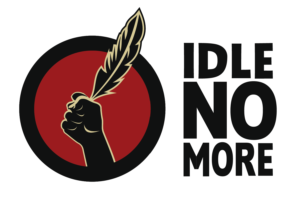Turning the Tide on Educational Opportunities for Aboriginal Youth – Idle No More
Submitted by Liette Michaud
The year 2014 was not a banner year for First Nations in Canada. As the number of Murdered and Missing Aboriginal Women continued to rise, calls for a full inquiry and action plan remain unheeded and indeed the issue was “not high on our radar” according to prime minister Stephen Harper. No less worrisome is the ongoing stalemate between the federal government and the Assembly of First Nations (AFN) over Bill C33, the First Nations Control of First Nations Education Act (FNCFNEA). The Minister of Aboriginal Affairs refusal to return to the negotiating table despite a request to do so by interim National Chief Ghislain Picard is a sombre reminder of how deeply the wounds of institutional mistrust, neglect and willful ignorance have hurt the healing of First Nations communities within Canada.
(1) As members of the Quebec Council of University Women’s Clubs, affiliated with the Canadian Federation of University Women (CFUW), we are dedicated to promoting a better life for women and girls through education. We have fought many battles for equal access for women to educational opportunities throughout our long history of activism both here in Canada and internationally and we have backed up our words with generous scholarship awards funded by our members and our supporters. Several years ago, distressed by news stories describing Third World conditions on Canadian reserves, we decided to reach out to First Nations women to see how we could help.
The question was “how to do so in a respectful and productive manner when, we readily admitted amongst ourselves, we were so ill-informed about not only First Nations history but our own colonial past?” We first invited a Bishop’s University History professor to explain why the “Idle No More” movement had gained such rapid impetus, with a description of the various treaties in existence in Canada and the situation in Quebec. These facts had not been included in our Canadian education. Members of our executive joined the advocacy organization “Femmes autochtones du Québec /Quebec Native Women (in its 41st year) as Friends, and now maintain active Facebook contact with members of “Idle No More”. Both have proven invaluable.
In 2012, we were given the opportunity to volunteer at the Truth and Reconciliation Commission held in Montreal, allowing us to acquaint ourselves with the painful legacy of residential schools, to meet survivors and to hear their public testimonies. During the hearings we became aware of the wide diversity of the Indigenous population in Canada and the labyrinthian set-up of aboriginal educational programming that is under the jurisdiction of provinces and territories while funding for Indigenous schools is controlled by the federal government. The present gridlock in funding for Indigenous education coupled with the knowledge that funding ends when students are 16 years old is tantamount to criminal negligence. We cannot wait for politicians or bureaucrats to solve the impasse: we believe that we have a duty as citizens, Canadian and Indigenous, to take up the challenge of ensuring every aboriginal child has access to the same funding and educational opportunities that a Canadian child would have, based on local needs, culture and language.
We next held an Educational Forum in October 2013 focusing on challenges facing Indigenous women who wish to pursue post-secondary education with invited speakers from FAQ/QNW as well as the provincial government. It was time to move to action. We formed a Committee to investigate a partnership with a school in an Indigenous community. We were fortunate in that our now established relationships with Quebec Native Women’s Youth Representative and a professional from the Secretariat for Aboriginal Affairs of Québec (two of the invited speakers) helped us to quickly identify a community that was receptive to our initiative. In a face to face meeting with a local community leader, we learned that while there have been promising developments and support at the post-secondary level in the province, completing and obtaining a basic High School Diploma (DES) was still a challenge. Furthermore, since Adult Education is not funded, motivated young adults seeking out vocational training hit a wall. We hope to address these and other needs by forging friendships with educators, parents and students during our next visit in early 2015 and working collaboratively on a suitable project. We are delighted to report that individual university women’s clubs have already undertaken local initiatives. « Association des femmes diplômées des universités » in Québec City donates bursaries to women studying at a Vocational Training Centre in Wendake as well as providing a bursary to an Indigenous woman pursuing studies at Laval University. The Sherbrooke and District club has partnered with Champlain College in Lennoxville to provide meal tickets and other necessities for Indigenous students from the Gaspé region.
These local initiatives are part of a larger wave promoting and supporting aboriginal education. A CFUW policy resolution adopted in 2009 encouraging the 105 non-partisan, self-funding clubs across Canada to advocate for increased funding for Indigenous education was expanded and brought to the 2013 International Federation of University Women (IFUW) AGM and Conference in Istanbul, Turkey where it was adopted unanimously. CFUW’s representative to the Canadian Commission for UNESCO in Ottawa often raises the issue of Indigenous education in Canada. From our perspective, Indigenous education should have been included in the UN Millennium Goals coming out of the Beijing Summit in 1995. “Canada faces a continuing crisis when it comes to the situation of Indigenous peoples of the country,” according to the UN Special Rapporteur on the rights of indigenous peoples James Anaya in a report released Monday (May 12 2014)(2). Let us do our utmost to make 2015 the year the crisis is adverted and the tide turns in favor of fully funded educational opportunities for all indigenous children and youth in Canada. (1) http://montrealgazette.com/news/national/opinion-justice-for-indigenous-children-the-heart-of-reconciliation (2) http://www.rcinet.ca/en/2014/05/12/un-special-rapporteur-crisis-among-indigenous-peoples-of-canada/.
